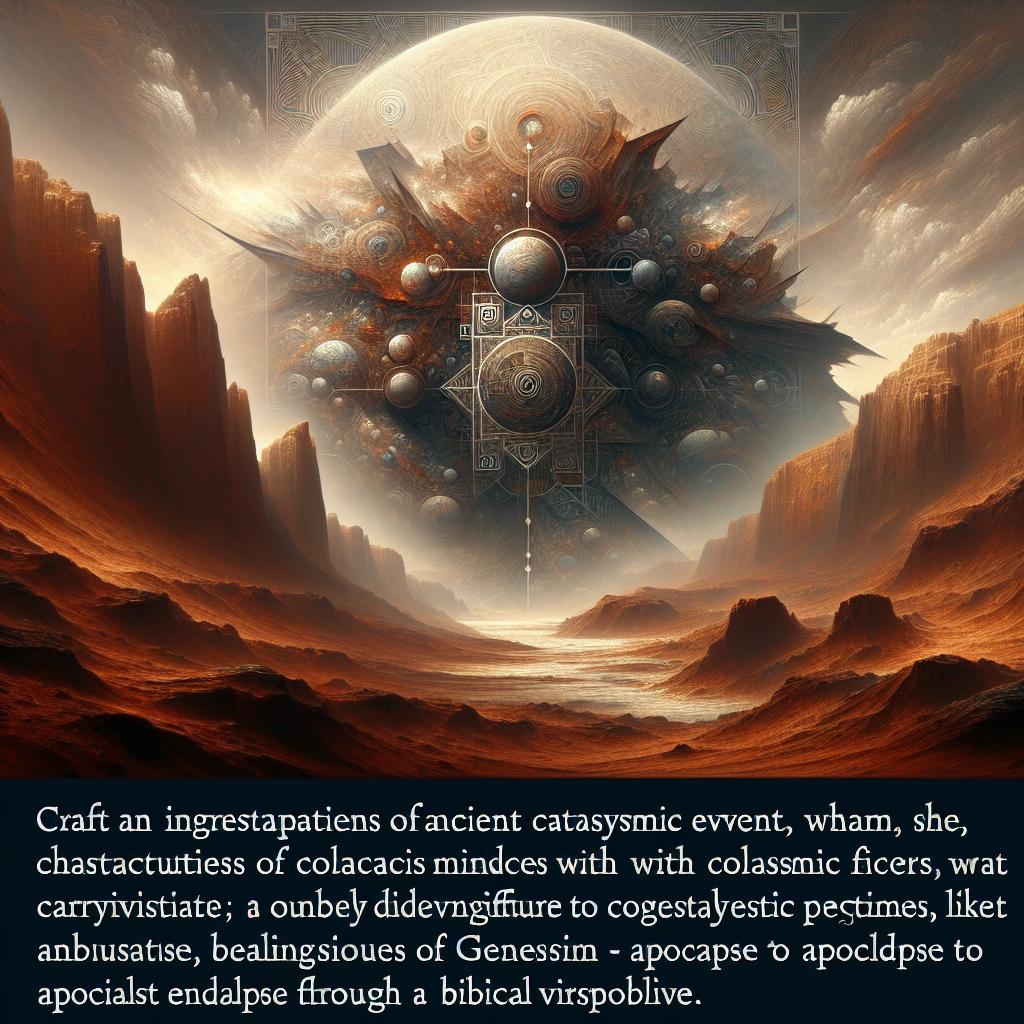
Unveiling the Divine Mystery of Mars Catastrophic Geology: A Christian Perspective
Published: 07 September 2024
Mars' Catastrophic Geology: Unveiling the Truth from a Biblical Perspective
Mars, our neighboring planet, has captivated the curiosity of scientists and space enthusiasts for centuries. Recent discoveries have shed light on the catastrophic nature of Mars' past, revealing rapid processes that have shaped its geology. While these findings may challenge conventional scientific beliefs, it is important to explore them from a staunchly conservative, biblical perspective. In this article, we will delve into eight key questions surrounding Mars' catastrophic geology, providing biblically-grounded answers that align with Christian values.
1. What evidence supports the idea of rapid processes on Mars?
Recent missions by NASA and the European Space Agency have unearthed compelling evidence of rapid processes on Mars. These include flooding, volcanism, glacial movement, sedimentary processes, and even geysers. The presence of buried impact structures in the Northern Lowlands, revealed by the Mars Express mission, suggests cataclysmic events that shaped the planet's surface. Moreover, channels and drainage patterns indicate the flow of water in the past.
2. How does Mars' thin atmosphere affect its geological processes?
Mars possesses a thin atmosphere, which would cause any liquid water on its surface to quickly evaporate or freeze. However, water and carbon dioxide ice exist on the poles and beneath the surface. The discovery of patches of water ice just below the surface by the Mars Odyssey spacecraft further confirms this. Mars' relatively low density suggests the presence of volatile materials such as water and carbon dioxide in its interior. This unique atmospheric composition plays a significant role in understanding the planet's geological phenomena.
3. Are there indications of water eruptions on Mars?
Indeed, evidence has been found pointing to water eruptions in Mars' past. Two channels known as Mangala Fossa and Cerberus Fossa provide insights into these cataclysmic events. Mangala Fossa appears to have carried hot water mixed with mud, while Cerberus Fossa acted as a carbonated water geyser. The eruptions propelled material several kilometers across the surface, creating channels and ridges. The force of these eruptions suggests that the water came from aquifers deep below the Martian surface.
4. What other large-scale catastrophic events have shaped Mars?
Mars' geological history is replete with various large-scale catastrophic events. The presence of massive volcanoes and evidence of glaciation point to dramatic processes that have shaped the planet's surface. Sedimentary deposits of sulfate and chlorite compounds, as well as the discovery of minerals similar to granite, hint at the involvement of water from beneath the surface. These findings underscore the significance of rapid, catastrophic processes in understanding Mars' geology.
5. How could Mars' atmosphere support liquid water in the past?
One ongoing mystery is how Mars' atmosphere could have sustained significant amounts of liquid water in the past. This is evident from the sedimentary deposits and surface channels carved by water flows. From a young-age creation perspective, several possibilities arise. Firstly, Mars may have had a thicker atmosphere initially, which was partially lost due to large impacts. Alternatively, powerful outgassing from the planet's interior after creation, potentially driven by accelerated radioactive decay, may have temporarily increased atmospheric density. Interior heating could then trigger massive melting of glaciers and subsurface ice, leading to extensive erosion caused by flowing liquid water.
6. What implications does Mars' cataclysmic past have for a young-age viewpoint?
The discoveries surrounding Mars' catastrophic geology align well with a young-age viewpoint. The rapid and dramatic processes observed on Mars indicate that these events occurred within a relatively short timeframe. This resonates with the biblical account of Creation, suggesting that Mars' geology can be reconciled with a young Earth perspective. While further research is needed, the evidence thus far supports the notion that Mars' past was shaped by catastrophic events in line with a young-age viewpoint.
7. What questions remain to be explored from a young-age creation perspective?
From a young-age creation perspective, there are still many unanswered questions regarding Mars' geology. One key area of investigation revolves around the initial atmospheric conditions on Mars. Was it originally thicker, and if so, what caused its partial loss? Furthermore, understanding the role of accelerated radioactive decay in outgassing and the subsequent melting of ice on Mars presents an intriguing avenue for research. Exploring these questions will deepen our understanding of Mars' cataclysmic past and its implications for a young Earth.
8. What practical applications can we draw from studying Mars' catastrophic geology?
Studying Mars' catastrophic geology not only provides insights into our neighboring planet but also offers valuable lessons for life on Earth. Recognizing that rapid and catastrophic processes can shape planetary landscapes reminds us of the fragility and transience of our own world. It underscores the importance of stewardship and responsible care for the Earth, as we seek to preserve and protect the natural wonders bestowed upon us by our Creator.
In conclusion, Mars' catastrophic geology reveals a fascinating tale of rapid processes and cataclysmic events. Analyzing these findings from a biblical perspective allows us to appreciate the wonders of God's creation even beyond our own planet. The evidence supports a young-age viewpoint, highlighting the need for further research to fully comprehend Mars' geological history. As we continue exploring the mysteries of space, may we always approach scientific discoveries with humility, awe, and a steadfast commitment to biblical truth.
Recommended Resources:
For further exploration on this topic from a conservative biblical perspective, consider the following resources:
- The Geology of Mars: A Biblical Perspective by John D. Morris
- Mars and the Bible: Exploring God's Handiwork by David R. Criswell
- Creation and Catastrophe on Mars: Understanding the Geological History by Andrew A. Snelling
- Mars Unveiled: Exploring the Mysteries of God's Creation by Michael J. Oard
